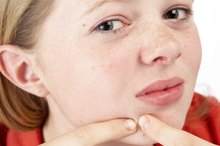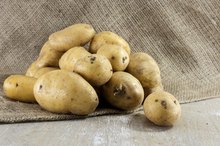What does fact checked mean?
At Healthfully, we strive to deliver objective content that is accurate and up-to-date. Our team periodically reviews articles in order to ensure content quality. The sources cited below consist of evidence from peer-reviewed journals, prominent medical organizations, academic associations, and government data.
- PubMed: Clinical and instrumental study of the efficacy of a new sebum control cream
- PubMed: Clinical and instrumental study of the efficacy of a new sebum control cream
The information contained on this site is for informational purposes only, and should not be used as a substitute for the advice of a professional health care provider. Please check with the appropriate physician regarding health questions and concerns. Although we strive to deliver accurate and up-to-date information, no guarantee to that effect is made.
Vegetable Oils & Acne
If you're worried about acne, it's a good idea to understand the products you're using and whether another product might be better 5. You may have heard that some vegetable oils can be used as skin moisturizers. However, results are mixed: some can cause or worsen acne and others have little effect on your skin 5. This can be true in certain cases, but you'll need to understand the full picture before making a choice.
Oil and Acne
Acne and oil have a long friendship 5. According to Teens Health from Nemours, acne tends to accelerate during the teen years, when your skin starts producing more of its natural oil, or sebum 1. Sebum and skin cells can clog your pores, causing pimples. Some people's skin overproduces sebum, giving them an oily complexion and an increased tendency to break out. It's important to understand your skin's individual needs before you apply oil. This can mean the difference between clear skin and acne attacks 5.
Types of Vegetable Oil
Beta Carotene for Acne
Learn More
In 2008, Bionic Beauty published a list of cosmetic ingredients ranked by their ability to cause acne 2. Several vegetable oils were listed on this scale. Cocoa and coconut butter are very likely to cause acne 5. Sesame oil, corn oil, avocado oil and soybean oil all have high levels of risk. Peanut oil and olive oil are mildly risky, while castor and safflower oil have low risk. Sunflower oil and mineral oil were listed as safe. However, the International Dermal Institute lists mineral oil as an occlusive, meaning that you should think twice before using it.
- In 2008, Bionic Beauty published a list of cosmetic ingredients ranked by their ability to cause acne 2.
- Sesame oil, corn oil, avocado oil and soybean oil all have high levels of risk.
Theories/Speculation
Scientists are experimenting with vegetable oils to determine whether they can actually help reduce the level of sebum your skin produces. A study published in the Journal of Cosmetic Dermatology used an extract from saw palmetto seeds, sesame seeds, and argan oil. This product, when applied twice daily, visibly reduced oily skin in 95% of the study participants. However, because this hasn't been studied completely, it isn't clear whether vegetable oils of any kind can have a positive effect on your skin.
- Scientists are experimenting with vegetable oils to determine whether they can actually help reduce the level of sebum your skin produces.
Diet and Acne
Butter as a Cause of Acne
Learn More
Likewise, the connection between diet and acne is still unclear 5. You may have heard that eating oily foods can make your skin worse. Some doctors claim that this is completely untrue. Dan at Acne.org writes that nobody really knows for certain, because no medical studies have produced conclusive proof 5. Whether or not eating oily foods causes breakouts, they are bad for your health. Dan suggests that a low glycemic diet with lots of vegetables, fruit, seafood and grass-fed meat can very likely improve your skin 5.
Recommendations
If you're having problems with acne, you should see a doctor or dermatologist. However, if acne is not a serious issue for you, you may be interested in experimenting with natural oils as skin moisturizers. In that case, try applying oils that are not listed as acne-causing substances. You may need to try a few types of oil until you find one that works best for your skin type.
- If you're having problems with acne, you should see a doctor or dermatologist.
- However, if acne is not a serious issue for you, you may be interested in experimenting with natural oils as skin moisturizers.
Related Articles
References
- Teens Health from Nemours: Why Do I Get Acne?
- Bionic Beauty: In Search of Cosmetics That Don't Cause Acne
- International Dermal Institute: Acnegenic ingredients to avoid in your skin care
- PubMed: Clinical and instrumental study of the efficacy of a new sebum control cream
- Acne.org: Diet and Acne
- Zaenglein AL, Pathy AL, Schlosser BJ, et al. Guidelines of care for the management of acne vulgaris. J Am Acad Dermatol. 2016;74(5):945-73.e33. doi:10.1016/j.jaad.2015.12.037
- Gieler U, Gieler T, Kupfer JP. Acne and quality of life - impact and management. Journal of the European Academy of Dermatology and Venereology. 2015;29 Suppl 4:12-4. doi:10.1111/jdv.13191
- American Academy of Dermatology. I have acne! Is it okay to wear makeup?
- American Academy of Dermatology. Moisturizer: Why you may need it if you have acne.
- Anderson KL, Dothard EH, Huang KE, Feldman SR. Frequency of primary nonadherence to acne treatment. JAMA Dermatol. 2015;151(6):623-6. doi:10.1001/jamadermatol.2014.5254
- Merck Manuals. Acne. Updated December 2018.
Writer Bio
An award-winning blogger, Jessica Blue has been promoting sustainability, natural health and a do-it-yourself attitude since graduating University of California, Berkeley in 2000. Her work, seen in a wide variety of publications, advocates an environmentally-responsible and healthy lifestyle.









